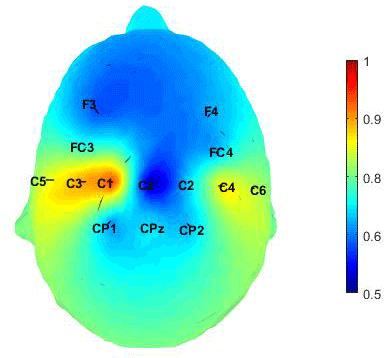Pitt researchers receive $550,000 NSF CAREER award to develop new brain-computer therapy method for people with autism

Credit: Murat Akcakaya
PITTSBURGH (March 21, 2019) … Autism was first described by U.S. researchers more than 70 years ago, and today the Centers for Disease Control and Prevention (CDC) estimates that 1 in 59 children are identified with autism spectrum disorder (ASD), affecting more than 3.5 million Americans.
Although clinical techniques are used to help patients with ASD respond to stress and other factors, none are known to couple with technology that could monitor brain response in real time and provide the patient with feedback.
However, thanks to a $550,000 award from the National Science Foundation, engineers at the University of Pittsburgh and clinicians at the UPMC Western Psychiatric Hospital, a new intervention using electroencephalography (EEG)-guided, non-invasive brain-computer interface (BCI) technology could complement clinical treatments and improve emotion regulation in people with ASD.
The multidisciplinary team includes Murat Akcakaya, PhD, assistant professor of electrical and computer engineering at Pitt’s Swanson School of Engineering, and Carla A. Mazefsky, PhD, associate professor of psychiatry and psychology in Pitt’s Department of Psychiatry. The proposal is funded through an NSF CAREER award, which supports early-career faculty who have the potential to serve as academic role models in research and education and to lead advances in the mission of their department or organization.
“People on the autism spectrum today have access to effective clinical strategies or technologies, but none are coupled effectively to provide real-time feedback in real-life activities. This limits reinforcement techniques that the patient can utilize on his or her own, without the need for a clinical appointment,” Dr. Akcakaya explained. “However, by utilizing EEG to couple clinical techniques with BCI technologies, we can develop a closed-loop system that will help patients better learn how to recognize emotional triggers and respond with appropriate techniques generalizing the effects of clinical treatment strategies to real-life activities.”
Akcakaya and Mazefsky will develop social interaction scenarios in virtual environments while recording EEG responses simultaneously in order to detect patterns that represent changes in distress levels. The virtual scenario will then present audio or visual cues to help remind them how to handle stress.
The project will also develop new machine learning algorithms and neuroscience methods to identify EEG features associated with emotion regulation to classify between distress and non-distress conditions, and to distinguish among different distress levels.
The two will also investigate the promise of these EEG and virtual reality approaches within the context of Mazefsky’s randomized controlled clinical trial funded by the US Department of Defense. The clinical trial is testing the efficacy of an intervention Mazefsky and colleagues developed, called the Emotion Awareness and Skills Enhancement (EASE) program, in 12- to 21-year-old verbal youth with ASD.
“EASE emphasizes awareness of one’s own emotional responses as a foundational skill that promotes the ability to manage intense negative emotions, which is taught through mindful awareness,” Mazefsky explained. “By coupling the clinical strategies we teach in EASE with technological interventions, we believe we can enhance patients’ ability to distinguish different distress levels and therefore potentially reap even greater (and more generalized) benefit.”
The CAREER award will also enable Akcakaya to develop courses related to the research and outreach activities to promote STEM and ASD research to K-12 populations and the broader public. Outreach will focus especially on individuals with ASD, their families, and caretakers.
“Early diagnosis and intervention can help patients with ASD and their families improve quality of life, and so providing clinicians with a new tool that both enhances and reinforces what patients learn is critical to closing the loop between triggers and responses,” Akcakaya said. “Additionally machine learning based on biological responses could also be integrated in to the existing technologically driven intervention techniques targeting patients across the autism spectrum.
“Eventually, the technology could be incorporated in an accessory like a smart watch or glasses, enhancing patient privacy and building confidence.”
###
Media Contact
Paul Kovach
[email protected]
Original Source
https:/




